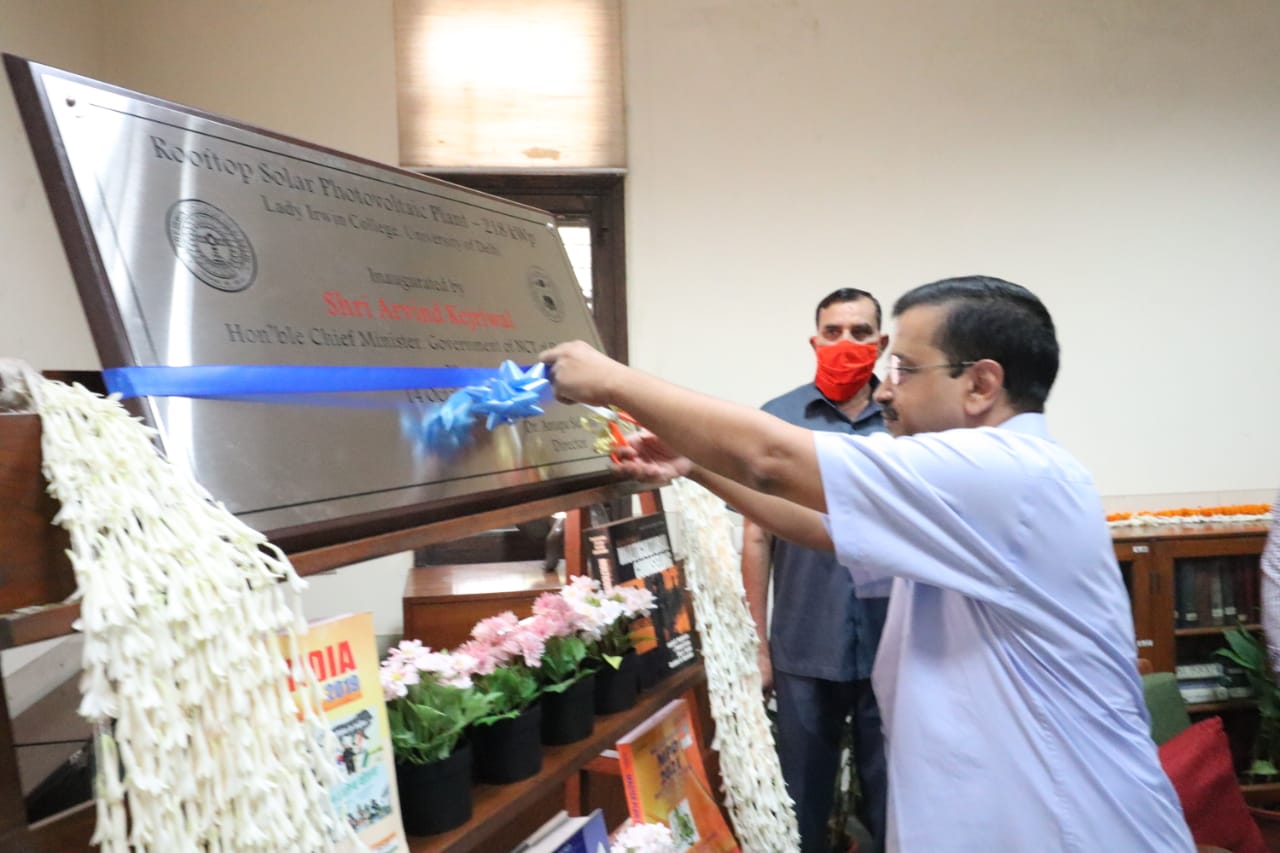New Delhi: Inaugurating the 218 kWp solar power plant at Lady Irwin College today, CM Shri Arvind Kejriwal said that to strengthen the solar power usage in Delhi, the solar energy has to be transformed into a mass movement. He said that the Delhi government has done formulated major policies for solar energy usage in the city, such as Mukhya Mantri Solar Power Yojana, that includes incentivizing the installation of solar power plants for residential and commercial properties and Mukya Mantri Kisan Aay Badhotri Solar Yojana that includes increasing the income of farmers by three to four times. He also said that Green Energy is the future of resources of energy, and Delhi will soon become the Solar Capital of India through such initiatives.
CM Shri Arvind Kejriwal said, “I feel glad to be inaugurating the 218 kWp solar power plant at Lady Irwin college today, Lady Irwin College is one of the most prestigious colleges of the country. The solar power journey of Delhi has just begun, and we do not have many achievements in this space. Considering that, when institutes like Lady Irwin College take initiatives from the forefront, they turn into an example and an inspiration for other institutes and organizations. I want to congratulate Lady Irwin College for taking an initiative. I want to thank Okridge energy for successfully completing the project despite adverse conditions and time constraints. In the last few years, we have formulated a policy framework for solar energy.

Delhi has shown the way in being at the forefront of expanding the scope of solar power energy in the city. Some of the schemes to promote solar energy in Delhi are introducing Delhi Solar Energy Policy 2016, Mukhya Mantri Solar Power Yojana and Mukya Mantri Kisan Aay Badhotri Solar Yojana.
Under the Delhi Solar Energy Policy 2016, various locations in the capital have been solarized to promote the usage of solar power. In the last four years, around 206 Delhi government schools have been solarized. Rooftop solar power plants have been deployed on more than 15 Delhi University Colleges and all major ITI, medical, polytechnic, and government engineering colleges and educational institutions. Some prominent installations are done in colleges such as DTU, NSIT, GGSIP University, and IGDTUW. Tihar, Rohini, and Mandoli Jails are also solarized.
Mukhya Mantri Solar Power Yojana
The Delhi government introduced Mukhya Mantri Solar Power Yojana in September 2018, which was envisaged accelerating the adoption of solar photovoltaic in the residential sector (including Cooperative Group Housing Societies CGHS) apart from the institutional and government sectors.
Solar plants have been installed on rooftops in various societies, i.e., Milan Vihar CGHS Patparganj (140 kW), Shiv Bhola CGHS Dwarka (100 kW), and Kamal Vihar CGHS Dwarka (200 kW) among others.
Mukya Mantri Kisan Aay Badhotri Solar Yojana
Group Net Metering and Virtual Net Metering for Renewable Energy, Guidelines 2019 – As per guidelines, GNM Framework would be applicable for all consumers category in Delhi. Whereas, VNM Framework shall be applicable for residential consumers, government establishments, and Renewable Energy Generators registered under Mukhya Mantri Kisaan Aay Badhotari Yojna (MMKABY).
According to the scheme, the maximum of one-third surface area of farmland can be used for the installation of solar panels in such a way that agriculture activity is not affected. This will increase the annual income of farmers in the national capital by three to five times.
A demonstration Solar project of 110 kW under ‘Mukhyamantri Kisan Aay Badhotri Solar Yojana’ is currently in the development stage at Krish Vigyan Kendra Ujwa, Delhi. It will be commissioned by November 2020.
DMRC has installed more than 20 MW solar projects in Delhi. DMRC is also getting around 50 MW of electricity from the REWA Ultra Mega Solar Power Project (of the total capacity of 750 MW).
The Delhi government has signed low tariff renewable energy power purchase agreements and has played a major role in enabling DISCOMS to enter into PPAs for 2000 MW of renewable power at the lowest rates in the country of about Rs 2.8 per unit.
Around 2000 MW of Solar and Wind energy PPAs have been signed between 2015-2019 at an average cost of Rs. 2.8 per unit.